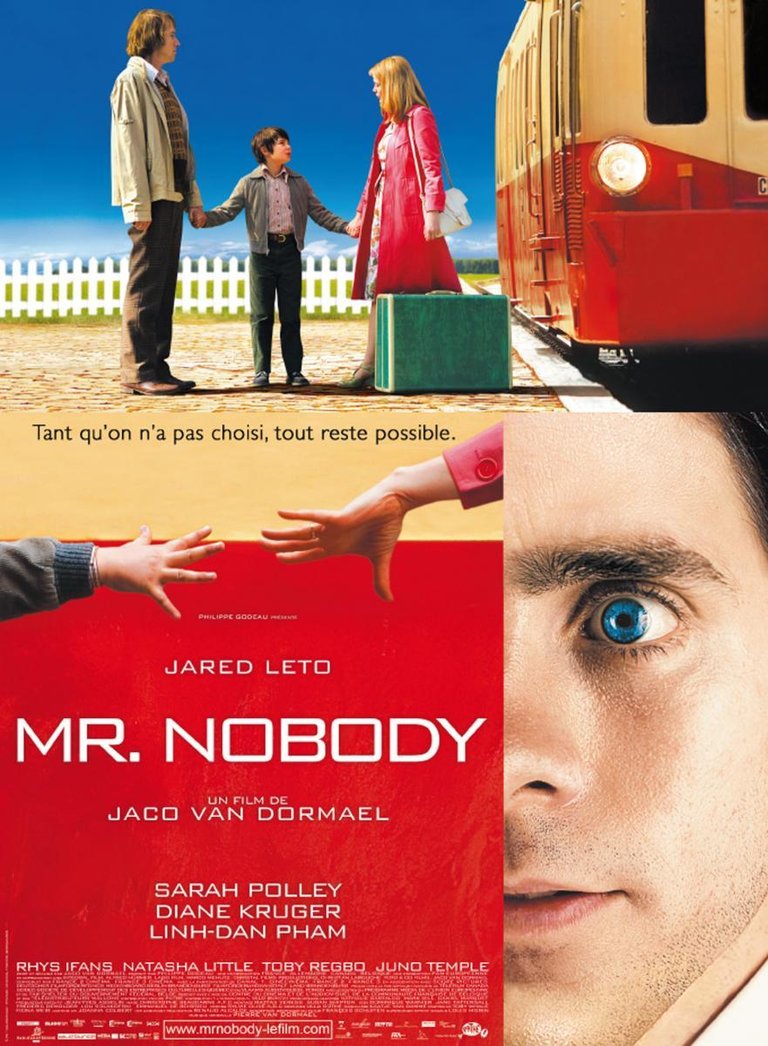
https://m.filmaffinity.com/es/film716107.html
One of the strangest films I have seen that is not the predilection of many film buffs is Mr Nobody, by Belgian director Jaco Van Dormael. In reality, the work is a kind of matrioshka or russian doll, where one story is inside another in a succession of superpositions. Perhaps this complex composition is what makes it difficult to understand and enjoy by an audience accustomed to plots developing in a more linear and traditional way.
Mr Nobody tells the life story of Nemo at different ages: a centenarian old man, a mature man, a teenager and a child. But more than telling the story of his life, it tells the possible stories that he could have lived if he had made other decisions. His parents divorce when he is still a few years old. What would his daily life be like if he chose to live with mom or dad?... Three girls are in love with him. Nemo imagines in detail his respective marriages with each one.
But even within these possible lives, our hero practices various trades that in turn become subplots of these surrounding stories.
The conflicts are based on fundamental issues in life: the affection of your parents during childhood, the choice of a partner in adolescence and the subsequent marriage commitment; the relationships between natural or social phenomena, no matter how far apart they are in space; but above all, the recurring theme is personal choice. What I enjoy most is that when the work is finished, I have the feeling that through a single person I have been able to feel many human lives. It is not about one character representing many personalities; but of many human lives possible from one or two choices in special moments.
One of the many fantastic winks that screenwriter Jaco Van Dormael also incorporates is the illusion of being able to go back in time. How would our personal experience develop if we could "rectify" or rather, choose again between the possible lines of life? We all sometimes wonder that.
Likewise, the relationship of the dramatic events is dotted with various reflections related to human psychology: sexual chemistry and instinct, the way memory works and innate conditions such as depression, down syndrome or social conditions such as find a purpose to existence; all of them as ramifications of the innocence with which a disturbed child faces a crossroads.
In other words, it is a matryoshka, and dressed in its folklore costume of arabesques and mosaics! It is not strange that it requires in the viewer an almost chess-like predisposition or attitude that not all film buffs wish to adopt when faced with a narrative art.
I love it as an artistic work that, in addition, is not free of poetry and good humor. It is perhaps my guilty pleasure although some of my friends do not choose it among their favorite feature films.
In short, despite all the nightmarish troubles that the protagonist suffers, it is, in depth, a tender story where a child searches for love, protection, in the midst of chaos caused, first, by the divorce of his parents, and second, for cause to the distance from the beloved girl due to a second divorce. Van Dormael guides the plot and the dependent subplots towards an intense finale that, thanks to the fantasy, has a lot of Paradise Regained.